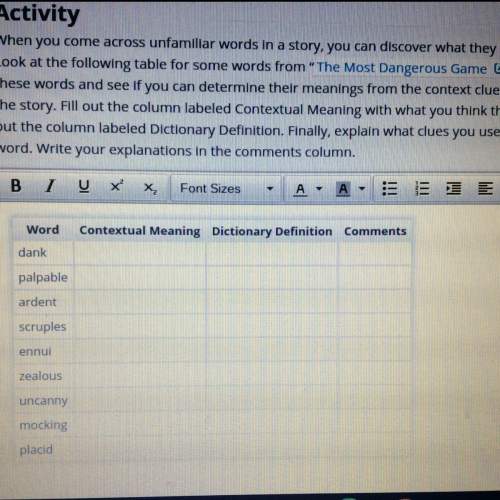PART A: Which of the following best identifies a central idea of the text?
A
While...

English, 09.04.2020 19:45 zarrialamons16
PART A: Which of the following best identifies a central idea of the text?
A
While stories are usually based on fiction, fears are based on facts and allow us to adequately prepare for threatening situations.
B
Fears operate through the imagination much like storytelling does, and we can learn from our fears just as we can learn from stories.
C
Because the human mind is naturally attracted to dramatic narratives, the most elaborate fears usually draw the most attention.
D
Basing decisions off of a fear or a story can have disastrous consequences for ourselves and others, as neither are based on fact.

Answers: 3


Other questions on the subject: English


English, 21.06.2019 23:30, garciagang0630
With this 3 questions ! really need them right! 1. the first continental congress met in philadelphia on september 5, 1774. all of the colonies sent representatives except georgia. this congress continued in session until october 26, 1774. by then it had passed resolutions calling for a boycott against british trade. the author's main purpose was a. to inform b. to persuade c. to instruct d. to give an opinion 2. identify the point of view of each of the following passages. "my second mate was a round-cheeked, silent young man, grave beyond his years, i thought; but as our eyes happened to meet i detected a slight quiver on his lips. i looked down at once. it was not my part to encourage sneering on board my ship. it must be said, too, that i knew very little of my officers." (joseph conrad, "the secret sharer") a. first person b. third person limited c. third person omniscient d. none of the above 3. identify the point of view of each of the following passages. "he had only himself to in his choice: his fortune was his own; for as to frank, it was more than being tacitly brought up as his uncle's heir, it had become so avowed an adoption as to have him assume the name of churchill on coming of age. it was most unlikely, therefore, that he should ever want his father's assistance. his father had no apprehension of it." (jane austen, emma) a. third person omniscient b. third person limited c. first person d. none of the above
Answers: 1

English, 22.06.2019 03:30, GiuliAzevedo
Used for an event that has been completed before the present moment in time. simple past past perfect perfect progressive past perfect progressive
Answers: 1

English, 22.06.2019 06:40, hannahhh565
Read this excerpt from rudolfo anaya’s essay “take the tortillas out of your poetry.”tortillas and poetry. they go hand in hand. books nourish the spirit, bread nourishes our bodies. our distinct cultures nourish each one of us, and as we know more and more about the art and literature of the different cultures, we become freer and freer. . i don’t know anyone who doesn’t like to sample different ethnic foods, the breads of many many groups; just as many of us enjoy sampling books from different areas of the world. i travel to foreign countries, and i know more about myself as i learn more about my fellow human beings. censorship imposes itself in my path of knowledge, and that activity can be justified by no one. which of these changes would make this excerpt more argumentative? using words that affect the audience’s sense of trustusing less repetition of certain words and phrasesincluding words that address logic and reasonincluding words that are charged with emotion
Answers: 2
You know the right answer?
Questions in other subjects:

History, 11.06.2021 18:20


Mathematics, 11.06.2021 18:20

English, 11.06.2021 18:20


Spanish, 11.06.2021 18:20

Mathematics, 11.06.2021 18:20



English, 11.06.2021 18:20




